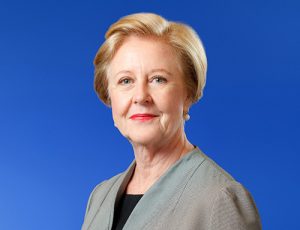Panel Discussion: It’s Time: Where to From Here on Refugee Policy?
Panel members include:
Professor Gillian Triggs
 Emeritus Professor Gillian Triggs is the former President of the Australian Human Rights Commission, and the new Chair of Justice Connect, a non-profit dedicated to connecting people locked out of the justice system with free legal help. She is also Vice Chancellor’s Fellow at the University of Melbourne and Vice President of the Asian Development Bank Tribunal.
Emeritus Professor Gillian Triggs is the former President of the Australian Human Rights Commission, and the new Chair of Justice Connect, a non-profit dedicated to connecting people locked out of the justice system with free legal help. She is also Vice Chancellor’s Fellow at the University of Melbourne and Vice President of the Asian Development Bank Tribunal.
Gillian was Dean of the Faculty of Law and Challis Professor of International Law at the University of Sydney from 2007-12 and Director of the British Institute of International and Comparative Law from 2005-07. She is a former barrister and a Governor of the College of Law. She graduated in Law from the University of Melbourne in 1968 and gained a PhD in 1982.
Gillian has combined an academic career with international commercial legal practice and has advised the Australian and other governments and international organisations on international legal and trade disputes.
After her tenure with the HRC ended, Gillian joined Justice Connect as Chair to pursue her commitment to ensuring that all people have a fair chance to access justice, including people experiencing homelessness, elder abuse, family violence and financial exploitation.
Post-HRC, Gillian is focused on helping lawyers ‘get out of the office’ and meet people who need legal help where they live. She is also the author of many books and papers on international law, the most recent “Speaking Up” will be published by MUP in October 2018.
Gillian is married to Alan Brown AM, a former Australian diplomat, and has two children and two grandchildren. She lives in Melbourne.
Erika Feller
 From January 2005 to April 2013 Ms Feller held the post of Assistant High Commissioner {Protection}, one of the four top management positions of the United Nations High Commissioner for Refugees, carrying the United Nations grade of Assistant Secretary-General. Her professional career has included 14 years and three international postings with the Australian diplomatic service, followed by 26 years with UNHCR, both in Geneva and the Field. As the High Commissioner’s Representative in Malaysia, Singapore and Brunei, she concurrently served as UNHCR’s Regional Coordinator for Status Determination for the Indo-Chinese refugee outflow. As Director of the Department of International Protection for six years, Ms Feller ran key protection negotiations, including the 2001-2 Global Consultations on International Protection, which generated the Agenda for Protection, an internationally endorsed multi-year “road map” for global refugee protection. As Assistant High Commissioner, Ms Feller exercised oversight of the performance by UNHCR of its core protection responsibilities world-wide, in the some 127 countries where the office was represented. She had direct responsibility for ensuring age, gender and diversity mainstreaming and accountability throughout UNHCR’s global programs.
From January 2005 to April 2013 Ms Feller held the post of Assistant High Commissioner {Protection}, one of the four top management positions of the United Nations High Commissioner for Refugees, carrying the United Nations grade of Assistant Secretary-General. Her professional career has included 14 years and three international postings with the Australian diplomatic service, followed by 26 years with UNHCR, both in Geneva and the Field. As the High Commissioner’s Representative in Malaysia, Singapore and Brunei, she concurrently served as UNHCR’s Regional Coordinator for Status Determination for the Indo-Chinese refugee outflow. As Director of the Department of International Protection for six years, Ms Feller ran key protection negotiations, including the 2001-2 Global Consultations on International Protection, which generated the Agenda for Protection, an internationally endorsed multi-year “road map” for global refugee protection. As Assistant High Commissioner, Ms Feller exercised oversight of the performance by UNHCR of its core protection responsibilities world-wide, in the some 127 countries where the office was represented. She had direct responsibility for ensuring age, gender and diversity mainstreaming and accountability throughout UNHCR’s global programs.
Ms Feller retired from UNHCR in April 2013. She was appointed a Fellow of the Australian Institute of International Affairs in 2013 and, in July 2014, a Vice-Chancellor’s Fellow at the University of Melbourne. As of January 2018 she is serving as a Professorial Fellow with the University’s School of Government. Her recent work has centered on regional refugee protection and on the reduction of statelessness. One outcome has been the creation in 2018 of the Peter McMullin Centre on Statelessness. Based in the Law School at Melbourne University, the Centre will focus on developing teaching, research and engagement projects to improve understanding of and responses to the problem in the Asia/Pacific region. Ms Feller is a founding Advisory Board member.
Outside the University, Ms Feller has been appointed by the United Nations Association of Australia [UNAA] as it pro bono Goodwill Ambassador for Global People Movements, Refugees and Asylum Seekers. She is also a member of the Research Advisory Committee of the Humanitarian Advisory Group, a social enterprise working to elevate the profiles of humanitarian action in Asia and the Pacific.
Ms Feller is an honours law graduate from Melbourne University, and holds an additional degree in the humanities, specialised in psychology. In 2015 she was awarded the Arts Alumni Award for Leadership. An academically acknowledged authority on refugee law, she has co-edited a book on Refugee Protection in International Law, is a contributor to the Max Planck Encyclopedia of Public International Law, has published widely in Journals and is an entrant in Who’s Who in International Law.
She is married, with two children.
David Manne

David Manne is a human rights lawyer and Executive Director of Refugee Legal (previously the Refugee & Immigration Legal Centre (RILC)). He has worked in various capacities assisting refugees and asylum seekers for over 20 years. In January 2001, he joined Refugee Legal, at the forefront of defending the rights, the dignity and the lives of asylum seekers, refugees and disadvantaged migrants.
David sat on the Board of the Refugee Council of Australia for seven years, and currently the Victorian Foundation for Survivors of Torture Ethics Committee, and a number of peak Government consultative bodies. He has also been appointed to the UN High Commissioner for Refugees Advisory Board of Eminent Persons. He has been invited to attend and present at the UN High Commissioner’s Dialogue on Protection Challenges on numerous occasions.
David has been the recipient of numerous prestigious awards, including the Law Institute of Victoria Paul Baker Prize for Administrative and Human Rights Law, the Law Institute President’s Awards (2006 and 2011), was shortlisted for the Australian Human Rights Commission Human Rights Medal in 2011 and been frequently named as one of Australia’s Leading Immigration Lawyers in the Australian edition of Best Lawyers.
David headed Refugee Legal’s legal teams in successfully arguing 10 out of 10 High Court challenges, including the cases of Plaintiff M61 (regarding the Government’s ‘offshore processing’ regime in Australia); Plaintiffs M70/M106 (the ‘Malaysia Solution’ case); Plaintiff M47 (challenging security assessment and indefinite detention of a refugee); Plaintiff M76 (regarding indefinite detention of a refugee on security grounds); Plaintiff M150 (challenge by a 15 year old unaccompanied refugee in relation to the Government’s attempt to bar permanent protection through a visa cap); and Plaintiff S89 (challenging a Government regulation designed to bar boat arrivals from permanent protection